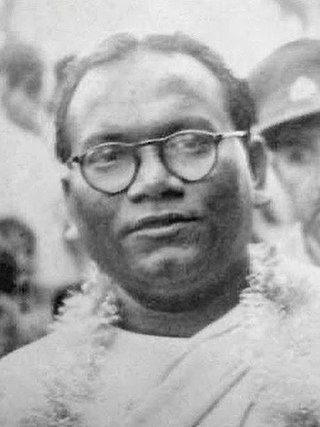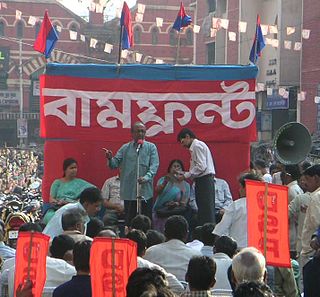Related Research Articles

The Communist Party of India (Marxist) (abbreviated as CPI(M)/CPIM/CPM) is a communist political party in India. It is the largest communist party in India in terms of membership and electoral seats ( 3 in Lok Sabha and 5 in Rajya Sabha ) and one of the national parties of India.

The All India Forward Bloc is a left-wing nationalist political party in India. It emerged as a faction within the Indian National Congress in 1939, led by Subhas Chandra Bose. The party re-established as an independent political party after the independence of India. It has its main stronghold in West Bengal. The party's current Secretary-General is G. Devarajan. Veteran Indian politicians Sarat Chandra Bose and Chitta Basu had been the stalwarts of the party in independent India.

The East Pakistan Provincial Assembly, known as the East Bengal Legislative Assembly between 1947 and 1955, was the provincial legislature of East Pakistan between 1947 and 1971. It was known as the East Bengal Assembly from 1947 to 1955 when the provincial name was changed. The legislature was a successor to the Bengal Legislative Council and the Bengal Legislative Assembly, which were divided between East Bengal and West Bengal during the partition of Bengal in 1947. It was the largest provincial legislature in Pakistan. Elections were held only twice in 1954 and 1970.

Jogendranath Mandal, was one of the founding fathers of the modern state of Pakistan, and legislator serving as country's first minister of law and labour, and also was second minister of Commonwealth and Kashmir affairs. In the cabinet of Interim Government of India, He got the law portfolio before. As a leader of the Scheduled Castes (Dalits), Jogendranath Mandal campaigned against the division of Bengal in 1947, believing that the divided Bengal would mean that Dalits would be at the mercy of the Muslim majority in East Bengal (Pakistan), and at the thraldom of majority caste-Hindus in West Bengal (India). In the end, he decided to maintain his base in East Pakistan, hoping that the Dalits would be benefited from it and joined the first cabinet in Pakistan as the Minister of Law and Labour. He migrated to India a few years after partition after submitting his resignation to Liaquat Ali Khan, the then Prime Minister of Pakistan, citing the anti-Dalits bias of Pakistani administration.
United Bengal was a proposal to transform Bengal Province into an undivided, sovereign state at the time of the Partition of India in 1947. It sought to prevent the division of Bengal on religious grounds. The proposed state was to be called the Free State of Bengal. A confessionalist political system was mooted. The proposal was not put up for a vote. The British government proceeded to partition Bengal in accordance with the Mountbatten Plan and Radcliffe Line.
In India, a number of political positions and university posts are held for specific groups of the population, including Scheduled Castes and Scheduled Tribes, and women in some cases.
Communism in India has existed as a social or political ideology as well as a political movement since at least as early as the 1920s. In its early years, communist ideology was harshly suppressed through legal prohibitions and criminal prosecutions. Eventually, communist parties became ensconced in national party politics, sprouting several political offshoots.

The Krishak Sramik Party was a major anti-feudal political party in the British Indian province of Bengal and later in the Dominion of Pakistan's East Bengal and East Pakistan provinces. It was founded in 1929 as the Nikhil Banga Praja Samiti to represent the interests of tenant farmers in Bengal's landed gentry estates. Sir Abdur Rahim was its first leader. A. K. Fazlul Huq was elected leader in 1935 when the former was appointed as the president of the Central Legislative Assembly of India. In 1936, it took the name of Krishak Praja Party and contested the 1937 election. The party formed the first government in the Bengal Legislative Assembly. After the partition of British India, it was reorganized as the Krishak Sramik Party to contest the 1954 election, as part of the United Front. The coalition won the election and formed the provincial government in the East Bengal Legislative Assembly.
The Pakistan Socialist Party was a political party in Pakistan. It was formed out of the branches of the Indian Socialist Party in the areas ceded to the new state of Pakistan. The PSP failed to make any political breakthrough in Pakistani politics. Being a secular socialist party, which had strongly opposed the creation of the state Pakistan, the PSP found itself politically isolated and with little mass appeal. The party was labelled as traitors and kafirs by its opponents. The PSP found it difficult to compete with the Islamic socialism that Liaquat Ali Khan professed to in 1949.

The Pakistan National Congress (PNC), later known as the Bangladesh National Congress, was a political party that mainly represented the Hindus, Christians and other religious minorities in Pakistan. The party championed secularism in the Muslim-dominated state, and its electoral and organisational strength was mainly based in East Bengal.
Pulin De was a Bengali socialist leader. He was jailed for 12 years during British rule.
The Harijan Mandal was an Ambedkarite political party in Jammu and Kashmir. The party was founded in 1951. It was modelled on the Scheduled Castes Federation. Unlike its predecessor, the All Jammu and Kashmir Harijan Mandal, this organization was oriented towards electoral politics. It was led by Babu Milkhi Ram (president), Munshi Ram, Major Singh and Sain Das. The party was concentrated in Jammu. It was opposed to the Jammu Praja Parishad, which was dominated by upper caste Hindus. The party received government support during the reign of Bakshi Ghulam Mohammad.
Legislative elections were held in East Bengal between 8 and 12 March 1954, the first since Pakistan became an independent country in 1947. The opposition United Front led by the Awami League and Krishak Sramik Party won a landslide victory with 223 of the 309 seats. The Muslim League Chief Minister of East Pakistan Nurul Amin was defeated in his own constituency by Khaleque Nawaz Khan by over 7,000 votes, with all the Muslim League ministers losing their seats.

Legislative Assembly election was held in 2016 for the 294 seats of the Vidhan Sabha in the state of West Bengal in India. The All India Trinamool Congress under Mamata Banerjee won 211 seats, and thus was reelected with an enhanced majority. Like in the 2011 election, the poll was held in six phases, with the first phase divided into two days. The first phase was held in Naxalite-Maoist affected Red corridor areas with two polling dates: 4 April and 11 April. The other phases were held on 17, 21, 25, 30 April and 5 May. The result of the election was declared on 19 May.

The Left Front is an alliance of left-wing political parties in the Indian state of West Bengal. It was formed in January 1977, the founding parties being the Communist Party of India (Marxist), All India Forward Bloc, the Revolutionary Socialist Party, the Marxist Forward Bloc, the Revolutionary Communist Party of India and the Biplabi Bangla Congress. Other parties joined in later years, most notably the Communist Party of India.
Legislative Assembly elections were held in the Indian state of West Bengal in 1991. The election took place simultaneously with the 1991 Indian general election. The term of the assembly elected in 1987 lasted until February 1992, but the West Bengal government asked the Election Commission of India to arrange the election at an earlier date.
Charu Mihir Sarkar was an Indian politician who was a member of the West Bengal Legislative Assembly from 1967 to 1971 and served as Minister in the 1967 and 1969 United Front state cabinets.
Akshay Kumar Das was a Bengali Dalit politician of Pakistan, who served as a representative of East Pakistan in both the First and Second Constituent Assemblies, and held multiple ministries across the 1950s in governments formed by different political parties.
The East Bengal Scheduled Castes Federation, later the East Pakistan Scheduled Castes Federation, was a political party in Pakistan. In the first years after the independence of Pakistan, the party was one of the two main political parties of the Hindu minority population in East Bengal. After departure of its main leader Jogendra Nath Mandal in 1950, the party suffered a number of divisions. In the mid-1950s the party participated in different coalition governments at Pakistan Centre level and East Pakistan provincial level. After 1958 the party went into oblivion.
The Pakistan Gana Samiti was a political party in Pakistan.
References
- 1 2 3 DR. KAUSAR PARVEEN, DR. SAMINA AWAN. ROLE OF PAKISTAN NATIONAL CONGRESS IN THE CONSTITUTIONAL DEVELOPMENT IN PAKISTAN, 1947-1958 . J.P.H.S., Vol. LXX, No. 2
- ↑ Najma Chowdhury. The Legislative Process in Bangladesh: Politics and Functioning of the East Bengal Legislature, 1947-58 . University of Dacca, 1980. pp. 121, 164, 208
- 1 2 M.B. Nair. Politics in Bangladesh (A Study of Awami League : 1949-58) . Northern Book Centre, New Delhi, 1990. p. 163
- ↑ Muhammad Ghulam Kabir. Minority Politics in Bangladesh . Vikas, 1980. p. 17-18, 43, 87
- ↑ Khursheed Kamal Aziz. Party Politics in Pakistan, 1947-1958 . Sang-E-Meel Publications, 2007. p. 118